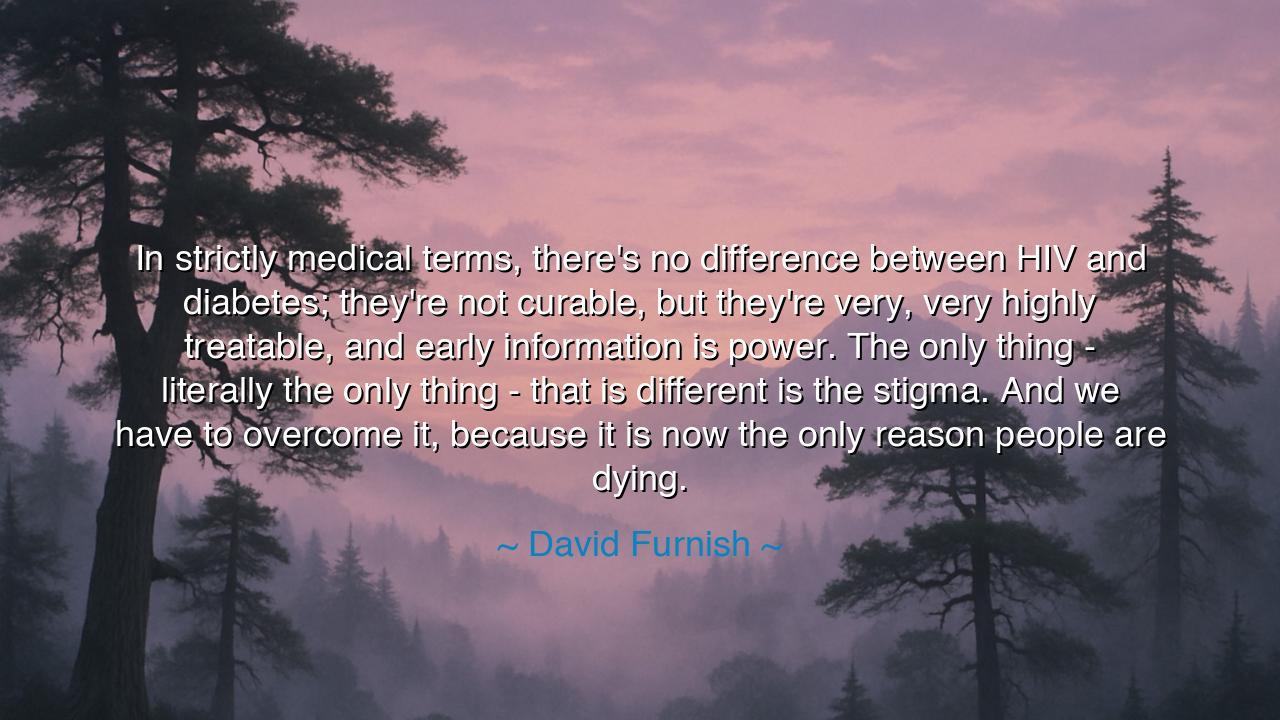
In strictly medical terms, there's no difference between HIV and
In strictly medical terms, there's no difference between HIV and diabetes; they're not curable, but they're very, very highly treatable, and early information is power. The only thing - literally the only thing - that is different is the stigma. And we have to overcome it, because it is now the only reason people are dying.






Hear the words of David Furnish, spoken with clarity, compassion, and righteous urgency: “In strictly medical terms, there's no difference between HIV and diabetes; they're not curable, but they're very, very highly treatable, and early information is power. The only thing—literally the only thing—that is different is the stigma. And we have to overcome it, because it is now the only reason people are dying.” In these words lies both a cry of truth and a rebuke of ignorance. He shows us that the plague of HIV, once feared as a death sentence, is today a disease manageable like diabetes, if only society would cast aside its prejudice and shame.
The origin of this statement lies in the history of medicine. When HIV first emerged in the 1980s, it brought terror, confusion, and death. Treatments were weak, and misinformation spread faster than science. Yet, through decades of relentless research, medicine created therapies that turned HIV from a fatal disease into a chronic, manageable condition. Like diabetes, it requires vigilance, treatment, and discipline, but it need not shorten life. Furnish reminds us that what keeps HIV deadly is not its biology, but the chains of stigma, which bind people in silence and fear, preventing them from seeking care.
The ancients, too, knew the power of stigma. In old times, those with leprosy were driven into exile, not because their disease was untreatable, but because fear and superstition made them untouchable. Whole lives were destroyed, not by the disease alone, but by the cruelty of others. So too with HIV today. It is not the virus itself that slays most, but the whispers of shame, the judgment of neighbors, the rejection of families. Stigma is the greater disease, invisible yet deadly, and it is this that Furnish calls us to conquer.
Consider the story of Magic Johnson, the great basketball player, who revealed in 1991 that he was living with HIV. In that moment, he shattered the illusion that HIV belonged only to certain groups, showing the world that it could touch anyone. By speaking openly, he became a living example that treatment works and that life continues. Yet even with his fame and resources, he faced stigma, suspicion, and discrimination. His courage gave hope, but his struggle revealed how deep the prejudice runs. This illustrates Furnish’s truth: science has triumphed, but society has not.
The meaning of Furnish’s words is heroic: that early information is power. Knowledge allows one to begin treatment, to control the disease, to live. Ignorance, driven by shame, delays testing, delays treatment, and leads to needless death. HIV and diabetes, he says, are alike in medical reality, but worlds apart in perception. Diabetes carries no social stain; HIV is burdened with fear and blame. This is injustice, pure and simple, and injustice must be overthrown if lives are to be saved.
The lesson for us is profound: we must fight stigma as fiercely as we fight disease. We must learn to see the person, not the condition. We must reject the whispers of shame and replace them with voices of compassion. For silence kills, but truth heals. The responsibility lies not only with doctors and governments, but with each of us in our speech, our judgments, and our willingness to embrace rather than exclude.
Practical action flows from this wisdom. Educate yourself and others about HIV and its treatments. Encourage testing, for knowledge is the first step toward survival. Support organizations that fight both the virus and the prejudice around it. Speak words of compassion, not condemnation, when the subject arises. And above all, refuse to let stigma linger in your presence—confront it, correct it, dissolve it. In doing so, you join the battle to ensure that no one dies of shame when they could live with treatment.
Thus Furnish’s words are not merely observation; they are a call to arms. He reminds us that science has done its part, but humanity must now do its own. The war against HIV is no longer against biology but against ignorance, no longer against the virus but against stigma. Let us rise to this challenge, for in doing so, we not only save lives but restore dignity. And in that restoration lies the true victory of medicine and the enduring triumph of compassion.






AAdministratorAdministrator
Welcome, honored guests. Please leave a comment, we will respond soon